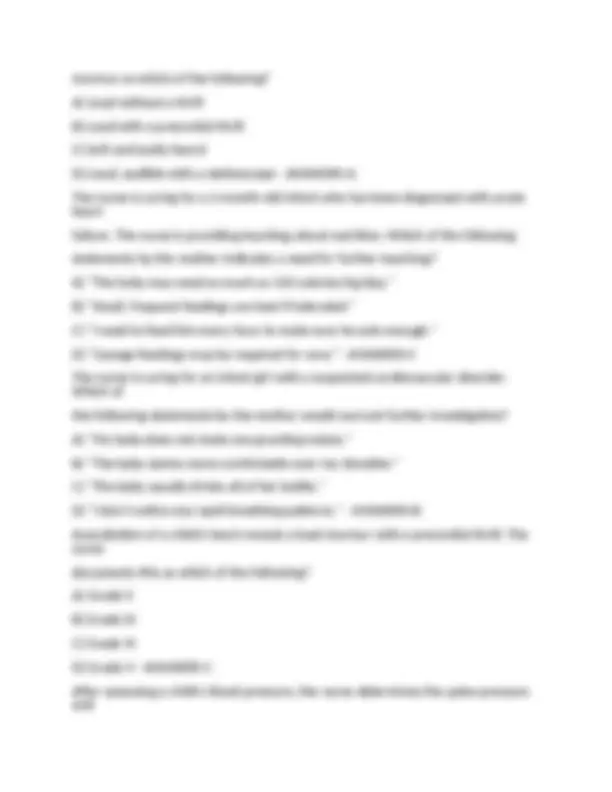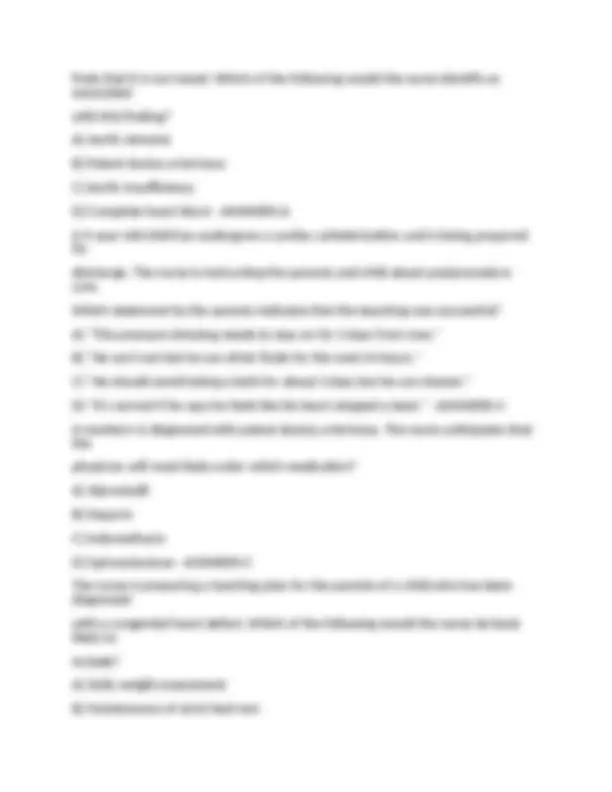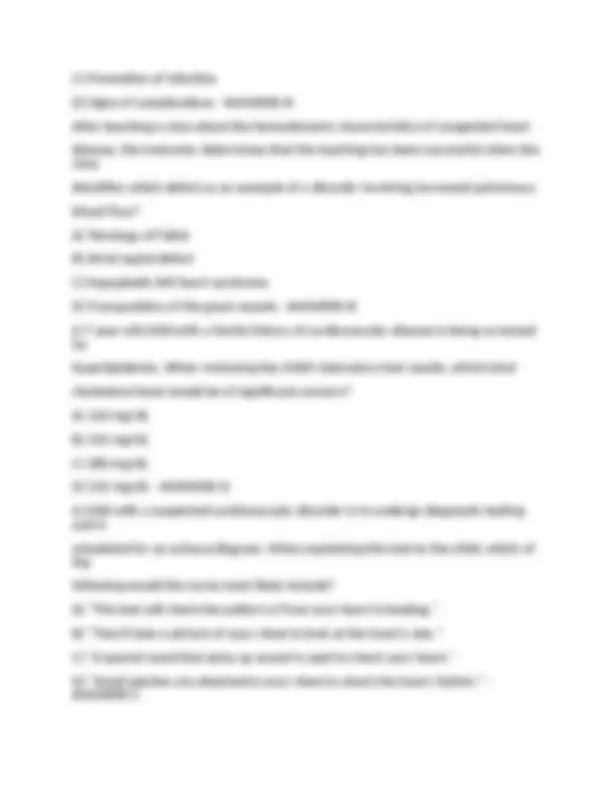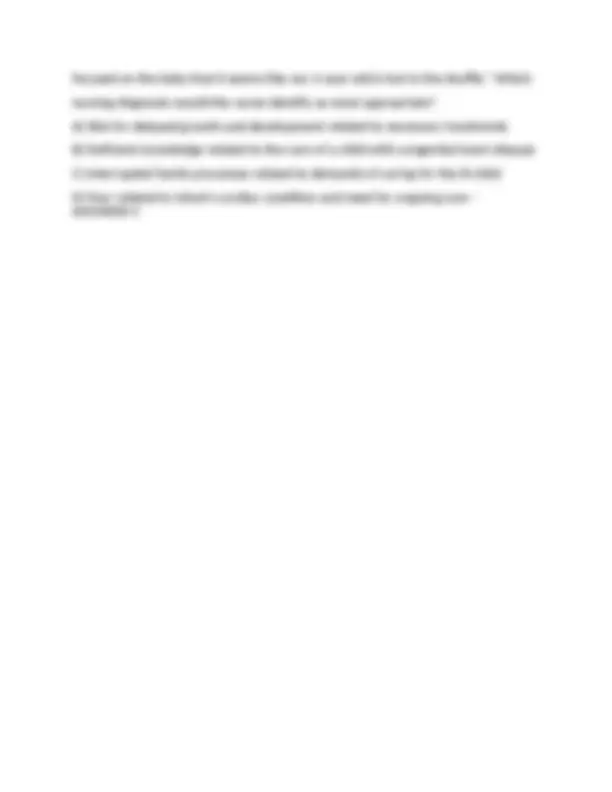






Study with the several resources on Docsity

Earn points by helping other students or get them with a premium plan


Prepare for your exams
Study with the several resources on Docsity

Earn points to download
Earn points by helping other students or get them with a premium plan
Community
Ask the community for help and clear up your study doubts
Discover the best universities in your country according to Docsity users
Free resources
Download our free guides on studying techniques, anxiety management strategies, and thesis advice from Docsity tutors
NUR 236 PrepU Chapter 41: Nursing Care of the Child With an Alteration in Perfusion/Cardiovascular Disorder Questions With Complete Solutions 2025 Graded A+ Pass., NUR 236 PrepU Chapter 41: Nursing Care of the Child With an Alteration in Perfusion/Cardiovascular Disorder Questions With Complete Solutions 2025 Graded A+ Pass.,
Typology: Exams
1 / 8

This page cannot be seen from the preview
Don't miss anything!





The nurse is conducting a physical examination of a child with a ventricular septal defect. Which finding would the nurse expect to assess? A) Right ventricular heave B) Holosystolic harsh murmur along the left sternal border C) Fixed split-second heart sound D) Systolic ejection murmur - ANSWERS-B The nurse is administering digoxin as ordered and the child vomits the dose. What should the nurse do next? A) Contact the physician B) Offer a snack and administer another dose C) Immediately administer another dose D) Administer next dose as ordered in 12 hours - ANSWERS-D The nurse is caring for an infant with suspected patent ductus arteriosus. Which of the following assessment findings would the nurse identify as helping to confirm this suspicion? A) Thrill at the base of the heart B) Harsh, continuous, machine-like murmur under the left clavicle C) Faint pulses D) Systolic murmur best heard along the left sternal border - ANSWERS-B The nurse is conducting a physical examination of a child with a suspected cardiovascular disorder. Which of the following findings would the nurse most likely expect to assess if the child had transposition of the great vessels? A) Significant cyanosis without presence of a murmur B) Abrupt cessation of chest output with an increase in heart rate/filling pressure
C) Soft systolic ejection D) Holosystolic murmur - ANSWERS-A The nurse is assessing a child with suspected infective endocarditis. Which of the following assessment findings would the nurse interpret as a sign of extracardiac emboli? A) Pruritus B) Roth spots C) Delayed capillary refill D) Erythema marginatum - ANSWERS-B When conducting a physical examination of a child with suspected Kawasaki disease, which of the following would the nurse expect to assess? A) Hirsutism or striae B) Strawberry tongue C) Malar rash D) Café au lait spots - ANSWERS-B After teaching a group of students about acute rheumatic fever, the instructor determines that the teaching was successful when the students identify which of the following as an assessment finding? A) Janeway lesions B) Jerky movements of the face and upper extremities C) Black lines D) Osler nodes - ANSWERS-B A nurse is reviewing the medical record of a child and finds that the child has a grade III murmur. After auscultating the child's heart sounds, the nurse would document this
finds that it is narrowed. Which of the following would the nurse identify as associated with this finding? A) Aortic stenosis B) Patent ductus arteriosus C) Aortic insufficiency D) Complete heart block - ANSWERS-A A 9-year-old child has undergone a cardiac catheterization and is being prepared for discharge. The nurse is instructing the parents and child about postprocedure care. Which statement by the parents indicates that the teaching was successful? A) "This pressure dressing needs to stay on for 5 days from now." B) "He can't eat but he can drink fluids for the next 24 hours." C) "He should avoid taking a bath for about 3 days but he can shower." D) "It's normal if he says he feels like his heart skipped a beat." - ANSWERS-C A newborn is diagnosed with patent ductus arteriosus. The nurse anticipates that the physician will most likely order which medication? A) Alprostadil B) Heparin C) Indomethacin D) Spironolactone - ANSWERS-C The nurse is preparing a teaching plan for the parents of a child who has been diagnosed with a congenital heart defect. Which of the following would the nurse be least likely to include? A) Daily weight assessment B) Maintenance of strict bed rest
C) Prevention of infection D) Signs of complications - ANSWERS-B After teaching a class about the hemodynamic characteristics of congenital heart disease, the instructor determines that the teaching has been successful when the class identifies which defect as an example of a disorder involving increased pulmonary blood flow? A) Tetralogy of Fallot B) Atrial septal defect C) Hypoplastic left heart syndrome D) Transposition of the great vessels - ANSWERS-B A 7-year-old child with a family history of cardiovascular disease is being screened for hyperlipidemia. When reviewing the child's laboratory test results, which total cholesterol level would be of significant concern? A) 120 mg/dL B) 150 mg/dL C) 180 mg/dL D) 210 mg/dL - ANSWERS-D A child with a suspected cardiovascular disorder is to undergo diagnostic testing and is scheduled for an echocardiogram. When explaining this test to the child, which of the following would the nurse most likely include? A) "This test will check the pattern of how your heart is beating." B) "They'll take a picture of your chest to look at the heart's size." C) "A special wand that picks up sound is used to check your heart." D) "Small patches are attached to your chest to check the heart rhythm." - ANSWERS-C
B) "I can eat any amount at a meal as long as I don't eat between meals." C) "I should eat plenty of fresh fruits and vegetables." D) "If I skip breakfast, I can eat a much bigger lunch." - ANSWERS-C A child is diagnosed with Kawasaki disease and is in the acute phase of the disorder. Which of the following would the nurse expect the physician to prescribe? Select all answers that apply. A) Intravenous immunoglobulin B) Ibuprofen C) Acetaminophen D) Aspirin E) Alprostadil - ANSWERS-ACD An infant with congenital heart disease is to undergo surgery to correct the defect. The mother states, "I guess I'm going to have to stop breastfeeding her." Which response by the nurse would be most appropriate? A) "That's true, but we'll make sure she gets the best intravenous nutrition." B) "Unfortunately, your baby needs more nutrients than what breast milk can provide." C) "Breast milk may help to boost her immune system, so you can continue to use it." D) "She won't be able to suck, so we have to give her fortified formula through a tube." - ANSWERS-C During a follow-up visit, the parents of a 5-month-old infant diagnosed with congenital heart disease tell the nurse, "We're just so tired and emotionally spent. All these tests and examinations are overwhelming. We just want to have a normal life. We're so
focused on the baby that it seems like our 3-year-old is lost in the shuffle." Which nursing diagnosis would the nurse identify as most appropriate? A) Risk for delayed growth and development related to necessary treatments B) Deficient knowledge related to the care of a child with congenital heart disease C) Interrupted family processes related to demands of caring for the ill child D) Fear related to infant's cardiac condition and need for ongoing care - ANSWERS-C